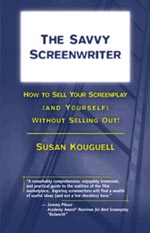
Becoming a ‘Savvy Screenwriter’
Written by Tiffany Patrick | Posted by: Anonymous
Susan Kouguell, award-winning screenwriter, filmmaker, and chairperson of Su-City Pictures East, is no stranger to the film industry. To filmmakers like Louis Malle or Harvey Weinstein, she needs no introduction. To working or aspiring screenwriters who may not know of her yet, she is an accomplished screenwriter and script doctor who has quite possibly written the most comprehensive new book you will read this year, "The Savvy Screenwriter."
Two things make this book a must read. First, "The Savvy Screenwriter" is as much for writers who have not written a screenplay as it is for those who have. Understanding what you need to do with your screenplay after it is written will likely help you conceptualize and write a better screenplay.
Second, Kouguell’s instruction is pragmatic. "To be honest, selling a script is like winning the lottery," says Kouguell. "Understanding how the film industry works and how to navigate it may seem an impossible task, but if you follow my step-by-step advice, you will discover the road best traveled." To get lucky you have to play the game, and for that, "The Savvy Screenwriter" is an invaluable tool.
The "Savvy Screenwriter" picks up where many screenwriting books leave off by telling you what to do after your screenplay is complete. "Bravo," Kouguell opens, "You’ve completed your screenplay. Now what?" What follows is a laundry list of next steps, such as how to find an agent or attorney, how to write an effective query and synopsis, how to tell when your script is ready for submission, how to make a pitch, and how to protect yourself throughout the contracting phase. Each chapter in "Screenwriter" is a stand-alone entity, a syllabus of sorts in what amounts to a textbook on marketing your screenplay and yourself.
Next, Kouguell answers some of the most commonly asked questions posed to her over the years by clients and students: How much money can a beginning screenwriter expect to make by selling a spec script? What exactly is a treatment? Do I need to write a treatment? Kouguell’s book contains peppered anecdotal evidence where a particular lesson was, in her experience, learned the hard way. Stylistically these stories appear in a typewriter font and often are written in the format of a screenplay. After a disastrous episode with a re-write and a young movie starlet, an aspiring screenwriter, Susan Kouguell, meets her friend at a New York Café:
KATE:
I got here as soon as I couldSUSAN:
You’ll never believe this. An agent called me and requested my original script of that groovy film. And even read it!KATE
Even after all those bad reviews?SUSAN
The agent said that if the film got made, there probably was a good script in there to start with. He also said that he wants to represent me!!!
Kouguell wants to make sure that her readers learn from her mistakes. How better to make her point.
Before jumping into how to submit your screenplay, Kouguell takes time to explain who will be reading your query letters and scripts, what they are looking for, and how they rate what they read. "Story analysts don’t just read a script and say yes or no to their superiors," Kouguell explains, "they write a story report known as coverage." Here is where Kouguell’s book becomes an invaluable blueprint for success. A former story analyst for Miramax Films, Kouguell outlines everything a screenplay writer needs to understand about how scripts are analyzed, describing how a single script will undergo multiple reads before ending up in the hands of someone with the power to make your script into a film.
Next, Kouguell coaches screenwriters through the process of polishing and submitting a script, and answers frequently asked questions such as "How do I start the querying process?" Among her suggestions is to get feedback from people knowledgeable about the film industry before submitting it. "Face the tough critique now," Kouguell says, "otherwise the chances of having your script rejected by an agent, production company, and/or studio are greatly increased."
As "The Savvy Screenwriter" progresses, its focus shifts from script to scriptwriter and thus becomes a valuable career guide, taking the reader through the pitch to contract negotiations and development deals, while explaining the intricacies of working with entertainment attorneys, finding an agent, and writing for hire.
What makes "The Savvy Screenwriter" an even more enduring piece of instruction is the list of screenwriting resources, such as www.wordplayer.com (an on-line screenwriting magazine) and the Volunteer Lawyers for the Arts, all listed alphabetically in the appendix. "The Savvy Screenwriter" is part autobiographical, part instructional, part reference book, and is as entertaining as it is instructional.
Kouguell currently teaches screenwriting at Harvard University’s Extension School and Tufts University. 'The Savvy Screenwriter' is published by TL Hoell Books, Exeter, NH and can be purchased at Amazon.com. More information can be found at www.savvyscreenwriter.com.










